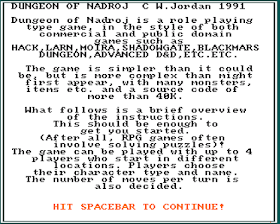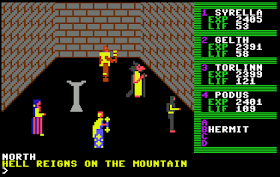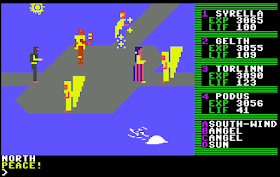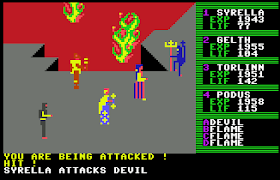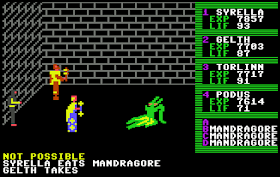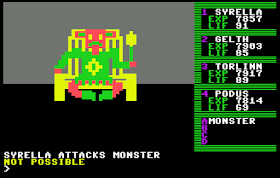Swords & Sorcery
United Kingdom
Personal Software Services (developer and publisher)
Released 1985 for ZX Spectrum, 1986 for Amstrad CPC
Date Started: 31 May 2016
Occasionally, I'm forced to confront the uncomfortable truth that between a Japanese teenager and a Brazilian tribesman who's never seen a computer before, I'm closer on the continuum to the tribesman. This usually happens when I play some modern game like Dark Souls. I might enjoy myself overall, but there are about 50,000 things I don't understand about the game mechanics, and apparently I shout a particular phrase so often that Irene insists she's going to have it inscribed on my real tombstone: "Wha...WHY DID I JUST DIE?!"
It's rare to have this experience with a 1985 game, but here I am with Swords & Sorcery. I can't make any sense out of what happens when I'm playing it. The messages that come and go on the screen seem to be random; the dialogue with NPCs seems to have been written by an insane person; items disappear from my inventory with no warning; spells fail to cast; commands don't do what they're supposed to do; and at least once every 5 minutes, I find myself yelling, "Wha....WHY DID I JUST DIE?!"
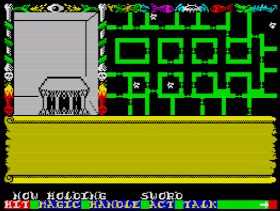 |
| It was going to be a while without a screenshot, so here's an image of an altar or table that I don't know what to do with. Note the menu selections at the bottom. |
What I do understand, I mostly hate. Take the controls. The idiotic interface has you keep three fingers of your left hand on the 1, 2, and 3 keys. 1 turns the character to the left, 3 turns him to the right, and 2 moves straight ahead. Meanwhile, three fingers of your right hand remain poised on 8, 9, and 0. 8 and 0 cycle through menus and sub-menus on the bottom of the screen and 9 selects which command or object you want. No other key on the keyboard is used except when you're naming your character.
I have this fantasy that if I yell loud enough my voice can transcend time and space. The employees of Personal Software Services will be able to confirm this if, one day in about 1984, while they were deep in development on Swords & Sorcery, the sound of an enraged male came booming into their offices. It would have said, "HEY, JACKASSES! IF YOU'RE DEVELOPING A GAME FOR A PERSONAL COMPUTER, AND YOU HAVE LESS THAN 26 COMMANDS, YOU DON'T NEED A COMPLICATED MENU SYSTEM!! JUST MAP EACH COMMAND TO A SENSIBLE KEY!!"
Why did so many developers act as if the computer was capable of no more than a joystick? Why was Richard Garriott--inventor of (A)ttack, (B)oard, (C)ast, (D)rop, and of course (Z)stats--one of the only ones to make use of the full, intuitive powers of the keyboard?
The controls would be bad enough even if everything happened smoothly. But it doesn't. As other things happening on the screen take up the game's attention, it fails to register a lot of your inputs. You end up selecting the wrong command, or accidentally double-pressing the "9" because it didn't seem like it "took" the first time. There's no excuse for it. It might literally be the worst interface of all time. Together, the interface and the overall weirdness ruined the game for me, although there are some interesting elements lurking beneath the surface.
I was expecting great things from Swords & Sorcery based on the reviews catalogued on its Wikipedia page. Superlatives like "the best Dungeons and Dragons version ever produced on the computer" and "Game of the Month" appear there. But we must remember that the game was published in the U.K., for the ZX Spectrum, a description that applies to maybe 6 games through 1985. The island and its favored platform were RPG-starved. Anything must have looked good.
Swords & Sorcery is similar to Alternate Reality in that the game is much more intent than achievement. It was supposed to be the first in a series called, for some reason, MIDAS. When the "game"--really just the first level--was published in 1986, the manual promised Level 2 and Levels 3 & 4 (two separate modules) available in December of that year, plus expansions called "The Village" and "The Arena" available in early 1986. These were never produced. Some later versions of the game came with a "mea culpa" letter from author Mike Simpson in which he apologized and said that "commercial necessity" had caused him to abandon the future modules. He did say that the Level 2 module had expanded in scope and would be published as a separate game--advertised by PSS as HeroQuest. It was also never released.
Swords & Sorcery is also one of the first games to come with an associated merchandising campaign, including t-shirts, posters, and "badges."
When you strip all that away, you have a one-level dungeon crawler that takes you through about 80 rooms on a quest to find four pieces of armor. Not even good pieces of armor: two sabatons (which cover the feet) and two greaves (which cover the legs). Talk about an uninspired main quest. There isn't even any real backstory. Oh, there's some doggerel about a dark wizard named Caballus and the legendary Armour of Zob, but clearly the writers were planning to flesh out the game world in later installments.
Character creation begins with a name, after which the character has to spend 14 days training with 12 teachers, each session taking one day. Each trainer teaches you a different thing, and you don't know what that is (the manual doesn't tell you) until after you've trained. Thus, you basically have to waste a character just figuring out the different training options. Four different trainers focus on swords, spears, staves, and unarmed combat respectively. One gives you extra strength for carrying things, another improves your skills as a thief, and another improves your skills as a mage. A guy named "Hubris" improves the chances that you'll detect things like traps; "Grieves" improves each NPC's starting disposition towards you, and "Jack" helps you jump better.
Finally, YAMA gives you the ability to resurrect if you die. You only have to take his training once, and that one training gives you 99 "lives." You'll need them.
I don't mind the character creation that much, aside from the lack of good documentation. It's one of the few early games in which the concept of "class" is more an assemblage of skills than a nominal category. You can spend 10 days training in "sword" and start out as an awesome fighter, do the same for magic, or try to achieve more of a balance of skills. The problem is I was never able to come up with an optimal combination. Combats are so deadly that you need raw weapon and spell power, but you need thieving skills to disarm traps and jumping skills to get over pits and "instinct" development to avoid traps in the first place. The only obvious thing is to not specialize in more than one weapon type.
After finishing your training, the game offers you the ability to spend a limited pool of starting money on items: a sword, a spear, a staff, a shield, a helmet, armor, gold (for bribing NPCs), bottles of wine, and pies. I learned the hard way that you basically want to spend all your money on pies. You can find starting equipment in the dungeon rooms--especially if you start with a lot of spell skill--but starvation is a constant danger in Swords & Sorcery. There's precious little food to be found in the dungeon, and if you don't eat every 15 minutes or so, you lose hit points until you die--at which point you'll be resurrected but still starving, thus doomed to a vicious circle until all 99 lives are gone.
You start in "Quadrant 1" of a four-quadrant dungeon level, each quadrant consisting of about 20 rooms and hallways in between. You navigate with a top-down map on the right and a scrolling 3-D view on the left--a reasonably original navigation system at the time. Each room has a combination of monsters, traps, and treasure. Specific rooms in each quadrant warp you to the next one.
Combat with the monsters is pretty basic, even though it takes a while to figure out what the computer is doing. Essentially, you and the monsters trade blows based on whatever attack and defense options you've pre-selected. The options available have to do with the weapon you've equipped and your skill level; for instance, a novice with a sword might just have an option to "HACK" while a more experienced fighter has a second option to "LUNGE." Your defensive settings work the same way. Initial characters can either just "STAND" and try to absorb the damage or "ATTACK," which basically means "counterattack" and return part of the damage done to the attacker. Once you get a shield, you have the option to use that for your defensive round.
Anyway, the rounds flash by slowly, with you and the enemy trading attacks--which can miss, deliver a "glancing" (non-wounding blow), wound, or kill instantly--until one of you is dead or flees. There really isn't any input from the player during this process unless you want to change your attack and defense stances or cast spells.
Magic works in a similar way. Every character gets "Firebolt" at the beginning. As your magic power grows, "Heal" comes next, then "Fear," and 13 more that I never saw. Each casting depletes spell points, but points recharge as you move around (unlike hit points--see below), so I'm convinced that focusing on magic is the key to winning the game. But just like everything else in Swords & Sorcery, things happen with spells that seem to make no sense. For instance, during combat, the game lets you cast a spell at any point, and as many times as you want in a row. There have been times that I've opened a door, let loose a "Firebolt," and killed an enemy before he can respond. But there have been an equal number of times that I've cast 6 "Firebolts" in a row in the middle of combat, had the game tell me that they all achieved "full effect," and yet seen no drop in the enemy's hit points.
Amidst all my complaints, I should recognize that the skill/spell system is, for all its faults, fairly original. Combat, magic, and thieving skills increase as you use them, offering more options to the player as the game goes along. In this, Swords & Sorcery anticipates Dungeon Master by a couple of years. I can't otherwise think of an earlier game that has quite this combination of elements. I just wish they had been implemented as part of a better package.
That statement also goes for the NPC dialogue system, which is highly original and coincidentally mirrors Fate: Gates of Dawn, the game I happen to be playing at the same time, even though I don't think the two titles have anything to do with each other. Both games feature encounters that could be combats or could be NPC dialogues, largely depending on your own attributes and the NPC's disposition. In the case of Swords & Sorcery, a number of the "monsters" wandering the dungeon--mages, warriors, catmen, and so on--will happily converse with you instead depending at least in part on a hidden "villainy" score that largely depends on whether your character is in the habit of sucker-punching anything that moves or whether you wait and see what he does first. Hostility begets hostility.
As in Fate, your goal with dialogue in S&S is to either charm or abuse the other NPC into capitulation, at which point you get him to do things you want him to do. On the carrot side of the options are friendly greetings and bribes; you can give NPCs any of the valuables you pick up in the game--gold, crowns, cups, even food. As far as I can tell, it's the only thing that you can do with gold, which makes bribery in this game a more viable option than in others. On the stick side, we have unfriendly greetings, insults, bragging, warcries, and threats.
Either way, the idea is that you keep using options on one side or the other until it's clear that the NPC has submitted. Most dialogue options seem to draw from a random bank of nouns and adjectives, creating a bizarre conversation as you and the NPC go back and forth:
-BEWARE SNAKE PIT CURSE ELSE I WILL CURSE YOU
-I AM A MIGHTY BLACK ROBED MAGICIAN
-BEWARE BROOM AND BUCKET MAN OR I WILL SLIME YOU
-DON'T KILL ME OH PANTRY PIE THROWER ELSE I WILL SHED YOUR BLOOD
-DEATH TO THE VIOLET CLUPEAN DOG
-BEWARE SLIMY YELLOW ZIT SAVE THAT I CUT OFF YOUR PARTS
-DOWN AT MY FEET HIDDEN MUSIC SEEKER SAVE THAT I SLIME YOU
If the NPC likes you and you use the friendly options, you can apparently figure out your relative combat and magic skills based on what the NPC calls you. For instance, if you barely know what you're doing in combat, the NPC will refer to you as an "adventurer" whereas a combat master will get "lord."
If you finally get an NPC to submit, you can ask for information about the dungeon, ask him to evaluate a specific item, or ask him to go away. "Evaluating" an item just returns his assessment of its value--it doesn't tell you what the item does, which is what you really need. "Information" returns one of a long and bizarre pool of hints. Some of them are obvious--"Beware Centerpoint" is a warning about the pits in the middle of Quadrant 1--but others won't become clear until I find an associated puzzle--"Music is the answer";"Jump from table to table"--and there's this whole string of them associated with a "password" that seems to make little sense:
-THE PASSWORD IS STONE, SOMETIMES GLOWING
-THE PASSWORD IS STONE, SOMETIMES COLD
-THE PASSWORD IS IMBUED WITH FIRE, SOMETIMES HOT
-THE PASSWORD IS DOWN A PIT, SOMETIMES IN A SACK
-THE PASSWORD IS HARD, SOMETIMES IN A SACK
I don't know if these all refer to the same password. If so, EMBER or COAL or something similar might fit most of the definitions.
What you really need the NPC to do, most of the time, is "go away." You can't walk over or past NPCs, so even if they're friendly, your primary goal is to clear them out of the room so you can search it for treasure. But "go away" hardly ever works--in fact, I'm hardly ever able to subdue the monster so that any command works--leading you to eventually give up and assault your partner in conversation (making the next monster more likely to be hostile) just so you can search the room and make sure it doesn't have one of the quest items.
If you can get a room to yourself, you might find chests, sacks, or just random items on the floor. I learned the hard way that these items might not be visible from adjacent squares, so you have to fully explore rooms and look in all directions. Chests might contain weapons, armor, gold, food, magic items, or even other chests to open. I've found a series of cups and crowns; I don't know if they have any purpose other than bribing NPCs. I've found several pendants and rings that give no clue as to their use, and at least one book that goes "bang" and kills me when I try to pick it up.
All of the originality to be found with the skills system and the NPC interface shrinks in consideration of the game's many shortcomings, all of which conspired to drive me from the game prematurely even though, with only 4 quadrants to systematically explore, it's probably eminently winnable. In addition to the ones described above, we have:
Despite these issues, I gamely tried to play it for a while, exhaustively exploring Quadrant 1, annotating all my finds (treasure locations appear to be fixed), and finding one of the pieces of armor that I need to "win" the level, before taking the appropriate warp room to Quadrant 2. There, the rooms were a lot more linear than in Quadrant 1, and my frustration began to build exponentially. Certain rooms were simply impassable without defeating the monster inside, and he'd kill me in one blow, sending me back to Quadrant 1 for resurrection.
Even so, I slowly pierced my way through the rooms until I encountered a room in the lower-right corner of the quadrant. Stepping into the room results in a message that says only "bang!" and half my hit points go away. This repeats until I die. There seems to be no way to avoid this happening, to avoid the room, or to prevent the damage. The manual offers no help.
I started to write this posting as a one-shot for the game. I was going to GIMLET it and move on. But I've been playing during a difficult and frustrating time (house-buying, moving, yet another new computer), so it's probable that I just lack patience all around. Swords & Sorcery has enough innovations that it's worth a full treatment if I can force myself to overlook its flaws. I'll leave it on the board and see what tips and explanations come along from veteran players and perhaps give it another shot after a couple of Fate sessions.
 |
| You might have thought about focusing more on the game first. |
When you strip all that away, you have a one-level dungeon crawler that takes you through about 80 rooms on a quest to find four pieces of armor. Not even good pieces of armor: two sabatons (which cover the feet) and two greaves (which cover the legs). Talk about an uninspired main quest. There isn't even any real backstory. Oh, there's some doggerel about a dark wizard named Caballus and the legendary Armour of Zob, but clearly the writers were planning to flesh out the game world in later installments.
Character creation begins with a name, after which the character has to spend 14 days training with 12 teachers, each session taking one day. Each trainer teaches you a different thing, and you don't know what that is (the manual doesn't tell you) until after you've trained. Thus, you basically have to waste a character just figuring out the different training options. Four different trainers focus on swords, spears, staves, and unarmed combat respectively. One gives you extra strength for carrying things, another improves your skills as a thief, and another improves your skills as a mage. A guy named "Hubris" improves the chances that you'll detect things like traps; "Grieves" improves each NPC's starting disposition towards you, and "Jack" helps you jump better.
Finally, YAMA gives you the ability to resurrect if you die. You only have to take his training once, and that one training gives you 99 "lives." You'll need them.
I don't mind the character creation that much, aside from the lack of good documentation. It's one of the few early games in which the concept of "class" is more an assemblage of skills than a nominal category. You can spend 10 days training in "sword" and start out as an awesome fighter, do the same for magic, or try to achieve more of a balance of skills. The problem is I was never able to come up with an optimal combination. Combats are so deadly that you need raw weapon and spell power, but you need thieving skills to disarm traps and jumping skills to get over pits and "instinct" development to avoid traps in the first place. The only obvious thing is to not specialize in more than one weapon type.
 |
| Creating a character by choosing training options. |
After finishing your training, the game offers you the ability to spend a limited pool of starting money on items: a sword, a spear, a staff, a shield, a helmet, armor, gold (for bribing NPCs), bottles of wine, and pies. I learned the hard way that you basically want to spend all your money on pies. You can find starting equipment in the dungeon rooms--especially if you start with a lot of spell skill--but starvation is a constant danger in Swords & Sorcery. There's precious little food to be found in the dungeon, and if you don't eat every 15 minutes or so, you lose hit points until you die--at which point you'll be resurrected but still starving, thus doomed to a vicious circle until all 99 lives are gone.
 |
| Note that I don't need food, but rather "pie" specifically. |
You start in "Quadrant 1" of a four-quadrant dungeon level, each quadrant consisting of about 20 rooms and hallways in between. You navigate with a top-down map on the right and a scrolling 3-D view on the left--a reasonably original navigation system at the time. Each room has a combination of monsters, traps, and treasure. Specific rooms in each quadrant warp you to the next one.
Combat with the monsters is pretty basic, even though it takes a while to figure out what the computer is doing. Essentially, you and the monsters trade blows based on whatever attack and defense options you've pre-selected. The options available have to do with the weapon you've equipped and your skill level; for instance, a novice with a sword might just have an option to "HACK" while a more experienced fighter has a second option to "LUNGE." Your defensive settings work the same way. Initial characters can either just "STAND" and try to absorb the damage or "ATTACK," which basically means "counterattack" and return part of the damage done to the attacker. Once you get a shield, you have the option to use that for your defensive round.
Anyway, the rounds flash by slowly, with you and the enemy trading attacks--which can miss, deliver a "glancing" (non-wounding blow), wound, or kill instantly--until one of you is dead or flees. There really isn't any input from the player during this process unless you want to change your attack and defense stances or cast spells.
 |
| Our initial attempts at greeting having failed, we are now engaged in combat. |
Magic works in a similar way. Every character gets "Firebolt" at the beginning. As your magic power grows, "Heal" comes next, then "Fear," and 13 more that I never saw. Each casting depletes spell points, but points recharge as you move around (unlike hit points--see below), so I'm convinced that focusing on magic is the key to winning the game. But just like everything else in Swords & Sorcery, things happen with spells that seem to make no sense. For instance, during combat, the game lets you cast a spell at any point, and as many times as you want in a row. There have been times that I've opened a door, let loose a "Firebolt," and killed an enemy before he can respond. But there have been an equal number of times that I've cast 6 "Firebolts" in a row in the middle of combat, had the game tell me that they all achieved "full effect," and yet seen no drop in the enemy's hit points.
Amidst all my complaints, I should recognize that the skill/spell system is, for all its faults, fairly original. Combat, magic, and thieving skills increase as you use them, offering more options to the player as the game goes along. In this, Swords & Sorcery anticipates Dungeon Master by a couple of years. I can't otherwise think of an earlier game that has quite this combination of elements. I just wish they had been implemented as part of a better package.
That statement also goes for the NPC dialogue system, which is highly original and coincidentally mirrors Fate: Gates of Dawn, the game I happen to be playing at the same time, even though I don't think the two titles have anything to do with each other. Both games feature encounters that could be combats or could be NPC dialogues, largely depending on your own attributes and the NPC's disposition. In the case of Swords & Sorcery, a number of the "monsters" wandering the dungeon--mages, warriors, catmen, and so on--will happily converse with you instead depending at least in part on a hidden "villainy" score that largely depends on whether your character is in the habit of sucker-punching anything that moves or whether you wait and see what he does first. Hostility begets hostility.
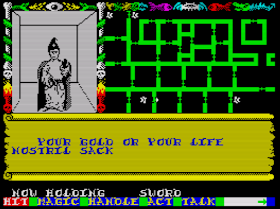 |
| I was just remarking that Fate is the first game I can remember that lets you mug an NPC. Well, here's an earlier one. |
As in Fate, your goal with dialogue in S&S is to either charm or abuse the other NPC into capitulation, at which point you get him to do things you want him to do. On the carrot side of the options are friendly greetings and bribes; you can give NPCs any of the valuables you pick up in the game--gold, crowns, cups, even food. As far as I can tell, it's the only thing that you can do with gold, which makes bribery in this game a more viable option than in others. On the stick side, we have unfriendly greetings, insults, bragging, warcries, and threats.
Either way, the idea is that you keep using options on one side or the other until it's clear that the NPC has submitted. Most dialogue options seem to draw from a random bank of nouns and adjectives, creating a bizarre conversation as you and the NPC go back and forth:
-BEWARE SNAKE PIT CURSE ELSE I WILL CURSE YOU
-I AM A MIGHTY BLACK ROBED MAGICIAN
-BEWARE BROOM AND BUCKET MAN OR I WILL SLIME YOU
-DON'T KILL ME OH PANTRY PIE THROWER ELSE I WILL SHED YOUR BLOOD
-DEATH TO THE VIOLET CLUPEAN DOG
-BEWARE SLIMY YELLOW ZIT SAVE THAT I CUT OFF YOUR PARTS
-DOWN AT MY FEET HIDDEN MUSIC SEEKER SAVE THAT I SLIME YOU
 |
| Two characters exchange pleasantries. |
If the NPC likes you and you use the friendly options, you can apparently figure out your relative combat and magic skills based on what the NPC calls you. For instance, if you barely know what you're doing in combat, the NPC will refer to you as an "adventurer" whereas a combat master will get "lord."
If you finally get an NPC to submit, you can ask for information about the dungeon, ask him to evaluate a specific item, or ask him to go away. "Evaluating" an item just returns his assessment of its value--it doesn't tell you what the item does, which is what you really need. "Information" returns one of a long and bizarre pool of hints. Some of them are obvious--"Beware Centerpoint" is a warning about the pits in the middle of Quadrant 1--but others won't become clear until I find an associated puzzle--"Music is the answer";"Jump from table to table"--and there's this whole string of them associated with a "password" that seems to make little sense:
-THE PASSWORD IS STONE, SOMETIMES GLOWING
-THE PASSWORD IS STONE, SOMETIMES COLD
-THE PASSWORD IS IMBUED WITH FIRE, SOMETIMES HOT
-THE PASSWORD IS DOWN A PIT, SOMETIMES IN A SACK
-THE PASSWORD IS HARD, SOMETIMES IN A SACK
I don't know if these all refer to the same password. If so, EMBER or COAL or something similar might fit most of the definitions.
 |
| This doesn't really help me. |
What you really need the NPC to do, most of the time, is "go away." You can't walk over or past NPCs, so even if they're friendly, your primary goal is to clear them out of the room so you can search it for treasure. But "go away" hardly ever works--in fact, I'm hardly ever able to subdue the monster so that any command works--leading you to eventually give up and assault your partner in conversation (making the next monster more likely to be hostile) just so you can search the room and make sure it doesn't have one of the quest items.
If you can get a room to yourself, you might find chests, sacks, or just random items on the floor. I learned the hard way that these items might not be visible from adjacent squares, so you have to fully explore rooms and look in all directions. Chests might contain weapons, armor, gold, food, magic items, or even other chests to open. I've found a series of cups and crowns; I don't know if they have any purpose other than bribing NPCs. I've found several pendants and rings that give no clue as to their use, and at least one book that goes "bang" and kills me when I try to pick it up.
 |
| Finding several useful items in a chest. |
All of the originality to be found with the skills system and the NPC interface shrinks in consideration of the game's many shortcomings, all of which conspired to drive me from the game prematurely even though, with only 4 quadrants to systematically explore, it's probably eminently winnable. In addition to the ones described above, we have:
- A weirdly micromanaged process for getting things out of chests. When you first encounter a chest, you want to scroll to ACT and then DISARM to make sure it doesn't have a trap. Then, depending on your thief skill, you go to ACT again and either PICK LOCK and CHEST or SMASH and CHEST. If you picked it, you then have to ACT and OPEN to open it. To get the items out of the chest, you choose HANDLE then TAKE OUT then CHEST and then the item. That simply moves the item to the floor. Then you choose HANDLE and PICK UP to finally get the item in your inventory.
- Inconsistent ways to work with inventory. To drop something, you go to HANDLE and then DROP and then pick the item. But to eat something or have an NPC evaluate something, you have to first go to HANDLE and then HOLD to equip the item and then ACT and EAT or TALK and COMMAND and EVALUATE THIS respectively. If you forget how it works, which is pretty easy, and accidentally go right to ACT | EAT expecting it then to give you a selection of items to eat, you instead end up eating your "held" item, which is usually your weapon. The game tells you that it's inedible, but that doesn't stop it from disappearing, forcing you to reload if you want to get it back.
- Pits appear out of nowhere (you can sometimes sense them, but not always), sending you plummeting to your death since there's no Level 2. Sometimes, these pits are in the middle of a hallway or room. To deal with them--and to solve some puzzles involving tables--you're supposed to be able to ACT | JUMP. But as far as I can tell, JUMP does nothing at all. I stand in front of pits and activate it repeatedly without even any acknowledgement.
 |
| One more step and I die. |
- Combat difficulty is weirdly random. Depending on when I open the door, an enemy might be capable of swatting away all my hit points with a single blow or may die equally as quickly.
- The 1 and 3 keys are supposed to turn you sideways, but sometimes--usually when you're facing an enemy that you want to flee rather than move closer to--they inexplicably move you forward instead.
- I can't figure out the rules on hit point regeneration. In Quadrant 1, they seemed to regenerate on their own as I moved around; in Quadrant 2, this seemed to stop and I only get healed when I cast the "Heal" spell. The "status" screen is inconsistent in how it updates in real-time; sometimes, in combat, it shows me (and my foe) at full health even though I know wounding has taken place. A few times, my hit points have just inexplicably disappeared with no obvious cause (e.g., poison), causing me to die in the middle of a corridor with no enemy in sight.
 |
| Dying in combat against a skeleton. I don't think I really have 21 hit points here. |
- Instead of just being clear with you about your statistics, the game gives you a set of mysterious "magic numbers" on the status screen. By checking these figures after different combinations of training, I can figure out what they mean. The second number seems to be combat skill, for instance; the third is thief skill; and the fourth is maximum magic points. Still, why not just be explicit about this?
 |
| Checking my status. I wish I knew what the "46" meant. The others, I have mostly figured out. |
Despite these issues, I gamely tried to play it for a while, exhaustively exploring Quadrant 1, annotating all my finds (treasure locations appear to be fixed), and finding one of the pieces of armor that I need to "win" the level, before taking the appropriate warp room to Quadrant 2. There, the rooms were a lot more linear than in Quadrant 1, and my frustration began to build exponentially. Certain rooms were simply impassable without defeating the monster inside, and he'd kill me in one blow, sending me back to Quadrant 1 for resurrection.
 |
| Finding one of the quest items. |
Even so, I slowly pierced my way through the rooms until I encountered a room in the lower-right corner of the quadrant. Stepping into the room results in a message that says only "bang!" and half my hit points go away. This repeats until I die. There seems to be no way to avoid this happening, to avoid the room, or to prevent the damage. The manual offers no help.
 |
| "Wha....WHY DID I JUST DIE?!" |
I started to write this posting as a one-shot for the game. I was going to GIMLET it and move on. But I've been playing during a difficult and frustrating time (house-buying, moving, yet another new computer), so it's probable that I just lack patience all around. Swords & Sorcery has enough innovations that it's worth a full treatment if I can force myself to overlook its flaws. I'll leave it on the board and see what tips and explanations come along from veteran players and perhaps give it another shot after a couple of Fate sessions.


